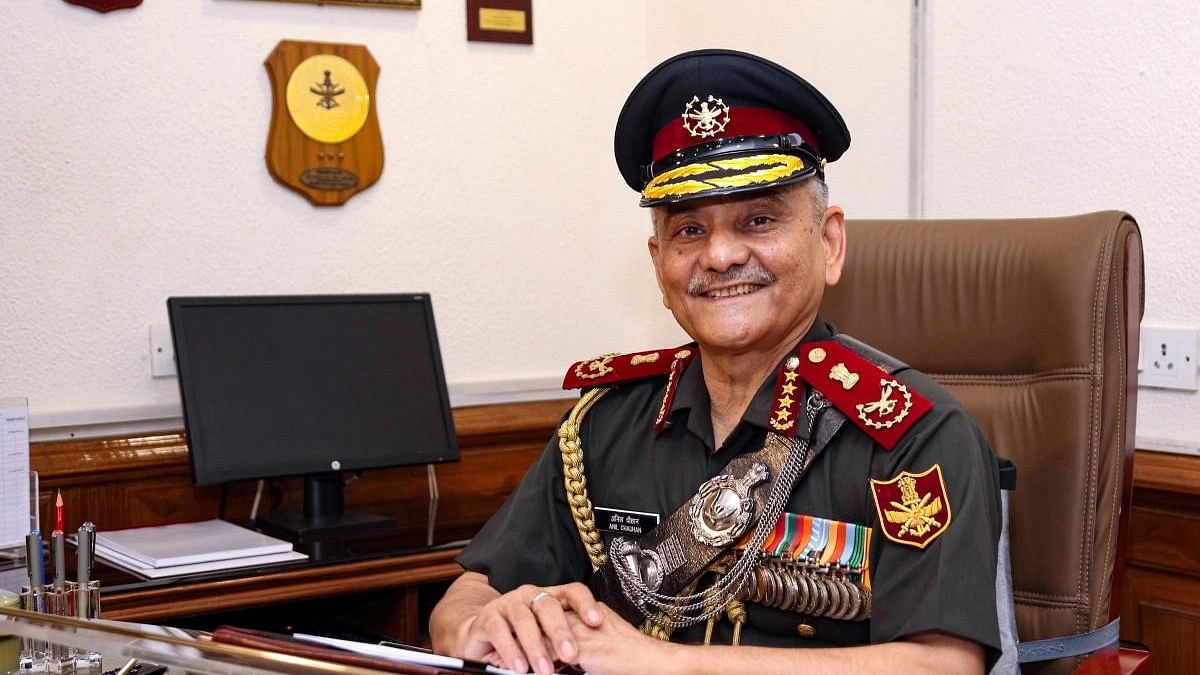
Chief of Defence Staff General Anil Chauhan.
Credit: PTI File Photo
Pune: Countless lessons from history serve as the foundation for strategic thinking and ancient Indian texts are repositories of knowledge that encapsulate this wisdom, Chief of Defence Staff General Anil Chauhan said on Saturday.
Speaking at the 'Kalam and Kavach' Defence Literature Festival here, CDS Chauhan gave examples from epics like the Mahabharata and Ramayana as well as Bhagavad Gita and asserted their ancient wisdom was relevant to today's strategic needs.
He emphasised the timeless relevance of Dharma from Indian scriptures, underscoring its principles of duty, righteousness and moral balance.
'Civilization's strategic thoughts are shaped by various factors such as geography, historical experience. The Indian civilization draws its strength from 5000 years of heritage. Countless lessons from Indian history serve as the foundation for strategic thinking. Ancient Indian texts encapsulate this wisdom and serve as repositories of knowledge,' he said.
Chauhan said the concept of 'just war', which is believed to have been laid down by St Augustine in the 4th century AD, existed in India from mythological times.
'Who other than Lord Ram was the main progenitor and proponent of this concept. In the Ramayana, Lord Ram had every right to go to war, and he and his army demonstrated ethical conduct during this war as Vibhishan was anointed king, captured territories were returned and he came back to his kingdom in Ayodhya,' the CDS pointed out.
In the Mahabharata, the Pandavas endured an assassination attempt in the 'Lakshagriha', saw unfair partition of their kingdom and their woman being insulted, which justified their decision to go to war, Chauhan said.
'In both the epics, if you look at the end game, it demonstrates a well-thought-of exit strategy, which was probably alluded to in modern conflicts. Both epics talk about the humility of the victor as well as inclusive approach towards the future involving both victor and vanquished. The method employed by Lord Ram and Lord Krishna can be called war termination and consolidation operations in today's parlance,' he opined.
The CDS also said the world of armed forces was on the cusp of a great change and termed it the third revolution of military affairs (third RMA).
'Its shapes and contours are not identifiable as of now but a general line is available to us. The Indian armed forces got left behind in the first and second RMA as the nation got left behind in the industrial revolution. So now what we are trying to do is to catch up with some technologies which came in during the first and second RMA,' he said.
Rushing to obtain a particular technology and changing its systems once it is had is an example of catching up with the West in the first and second RMA, he said.
The only way India can catch up with the advanced nations is to try and enter the third RMA along with them and that would require a lot of imagination as well as innovative and inventive kind of approach, he said.
'I have been advocating that this would be an RMA which will not be led by technology but by tactics. So that is the choice before us,' he opined.
India, at some point of time, was a 'vishwaguru' in fields like astrology, physics, medical, astronomy, science, mathematics, while the West was in the dark, but somehow this lead was lost, the CDS said.
Apart from being a 'vishwaguru', India was also a 'vishwa mitra' due to its basic ability to debate and analyse deeply, he added.
'Deep learning was a part of our DNA. Our DNA has not changed. We are still the same Indians who were vishwagurus at some point of time,' he asserted.
Ancient texts and stratagem, at a larger level, may help understand statecraft, diplomacy, or developing a grand strategy, but these may not look relevant when one looks at TTP, or 'tactics, techniques, and procedures', that are influenced by technology and when one talks about the third RMA, he said.
'But what I am trying to say is that it is relevant because it tells you that you were vishwaguru at one point of time and you have to think differently and produce something contemporary,' the general said.
Ancient stratagems are and should be a source of inspiration to develop thoughts on tactics, operations and the art of strategy and combat, he pointed out.
'Presently, we are conditioned to think in one way but we must use ancient texts and stratagem as inspiration to further rediscover ourselves. We need to welcome good ideas and develop our own,' the country's top military officer said.
The country is on the cusp of a great change, be it geo-political change, geo-economic change or technological change, and a change in mindset will allow it to leapfrog the world, he said.
This change in mindset will make our ancient wisdom relevant and drive us, the CDS asserted.
Pentagon Press, in collaboration with the Army's Southern Command, hosted the 'Kalam and Kavach' Defence Literature Festival here.